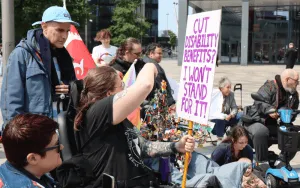Disabled activists have told an international human rights alliance that the UK’s “feeble” human rights body should have its prestigious “A” rating removed, because it has become a cheerleader for the UK government.
Disabled People Against Cuts (DPAC) said the Equality and Human Rights Commission (EHRC) was “not fit for purpose”, that it had been “co-opted” by the government, and that its primary mission appeared to be to “avoid rocking the boat”.
DPAC said the commission “no longer has credibility”, had “betrayed the communities that need it most” and no longer had the confidence of Deaf and disabled people.
Its evidence has been backed by four other disabled people’s organisations and two disability groups: Liberation, Being the Boss, Bringing Us Together, Adult Social Care Warriors, Norfolk DPAC and Chronic Illness Inclusion.
DPAC has submitted a statement to the Global Alliance of National Human Rights Institutions (GANHRI), along with a similarly-critical statement from the LGBTQ+ organisation Stonewall, with support from the Good Law Project.
Their concerns about EHRC’s actions have been supported by more than 30 other organisations.
GANHRI is partly funded by the UN and oversees national human rights institutions, and it will be reviewing EHRC’s status as an A-rated human rights body this autumn.
In a letter to GANHRI on behalf of DPAC, Stonewall and the Good Law Project, law firm Bindmans criticises EHRC’s “lack of actual and perceived independence” from the government.
The letter says that the commission has been seen as “increasingly close to, and unwilling to criticise” the government since 2015 and particularly since the election of a Boris Johnson-led government in 2019.
A “crucial factor”, it says, has been the appointment of EHRC commissioners who are “broadly supportive of the Government and its agenda”.
It also raises concerns about government cuts to its budget, which in 2021-22 was just £17 million, compared with the £70 million it received at its peak, and its failure to work constructively with voluntary sector organisations.
And it highlights how the commission has “consistently failed to respond to attacks by the Government on trans people’s rights”.
GANHRI rejected an application from Stonewall and other groups earlier this year for it to carry out a “special review” of EHRC’s accreditation, but it has now announced that the commission will have its accreditation assessed in the next round of regular reviews in October.
Among the concerns raised by DPAC is EHRC’s refusal to carry out an investigation into countless deaths of disabled benefit claimants that have been linked to the failings of the Department for Work and Pensions, despite “ample evidence”.
It also highlights its failure to act on the disproportionate application of do not attempt resuscitation orders on disabled people during the pandemic, and the failure to take action to ensure that disabled people’s right to independent living is upheld.
Only last month, DPAC adds, EHRC was heavily criticised for a “highly misleading and provocative” post on social media in which it stated that it “does not recommend that ‘long covid’ be treated as a disability”.
The commission later clarified its position, but DPAC said the effect of the tweet had been to “undermine the rights of disabled people with Long Covid to equality and non-discrimination in the workplace and beyond”.
DPAC also points in its evidence to the commission’s decision to scrap its designated disability commissioner role five years ago, and to dissolve its disability advisory committee in March this year, which it believes are “partly responsible” for the inaction on the DWP inquiry.
DPAC said EHRC’s current leadership and policy direction represented a “serious threat to not just the rights of disabled people, but all communities targeted by this Government”, including those who are trans and non-binary.
DPAC said it stood in solidarity with trans and non-binary people and that the “shift among the EHRC leadership to deny the rights of trans people” echoed the position taken by the UK government.
An EHRC spokesperson said this morning (Thursday) in a statement: “Protecting and advancing the rights of disabled people is a key element of our work, which includes holding government to account without fear or favour.
“We are a strong, independent human rights institution and have put forward a robust case for the renewal of our ‘A’ status that responds to all points raised.
“We value immensely our partnerships with civil society, including disabled people’s organisations, and urge groups who have been critical of the EHRC to work constructively with us to achieve a fairer society for all.”
Next month, the commission will hold a workshop where it will seek views from disabled people’s organisations and others on the implementation of its new three-year strategy.
A note from the editor:
Please consider making a voluntary financial contribution to support the work of DNS and allow it to continue producing independent, carefully-researched news stories that focus on the lives and rights of disabled people and their user-led organisations.
Please do not contribute if you cannot afford to do so, and please note that DNS is not a charity. It is run and owned by disabled journalist John Pring and has been from its launch in April 2009.
Thank you for anything you can do to support the work of DNS…

 This bill opens the door to scandal, abuse and injustice, disabled activists say after assisted dying bill vote
This bill opens the door to scandal, abuse and injustice, disabled activists say after assisted dying bill vote ‘We will not give a single inch,’ disabled activists vow, as Kendall publishes disability cuts bill
‘We will not give a single inch,’ disabled activists vow, as Kendall publishes disability cuts bill Activists consider legal action after DWP cancels only face-to-face benefit cuts consultation event in Wales
Activists consider legal action after DWP cancels only face-to-face benefit cuts consultation event in Wales